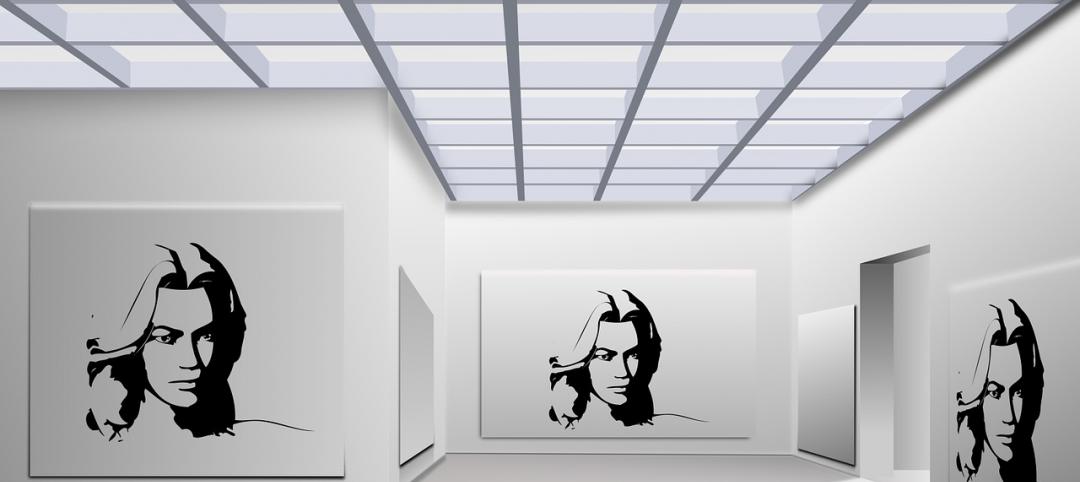From pearlescent and iridescent coatings to highly accurate color-matching tools to programmable, color-changing LED lights, color is taking on a bigger and increasingly high-tech role on building projects.
The widespread growth of colorized materials—from metal wall and roof panels to glass and glazing systems, to metal mesh assemblies—and the availability of custom colors across a broad range of product lines have provided architects and designers with almost limitless options for exterior and interior design projects.
Technology tools like 3D modeling software and color-matching apps have taken much of the guesswork out of evaluating colors and color palettes for building design projects. And advances in manufacturing—from new textile printing methods to novel coating formulations—are leading to breakthroughs in hues, patterns, textures, and special effects in colorized materials and finishes.
Given the “color craze” in architecture, it is no surprise that most design professionals believe that color plays a more-critical role in today’s building design projects than those from a decade ago.
Findings from BD+C's 2020 Color Trends Report
Two-thirds of architects, interior designers, and color experts surveyed between December 2019 and March 2020 by Building Design+Construction for the 2020 Color Trends Survey said that color on design projects (interior spaces and exterior design) is more important today than it was a decade ago. And fewer than 2% believe color is less important.
The growth in demand for color in the commercial, institutional, and multifamily building sectors is being driven by several converging trends. For one, clients are more willing to accept risk and variation on their projects, according to survey respondents.
“Especially for interiors, the story told by a color palette is crucial to creating an experience that can be differentiated from the norm,” said one architect respondent.
The rising cost of materials and construction is another important consideration: “Color is one of the easiest ways to add impact for the least amount of cost, thus more important today with the rising costs of everything.”
The final PDF report of BD+C's 2020 Color Trends Survey includes data on:
- Innovations in color and colorized materials
- Specification trends in color and colorized materials
- Source of color expertise and inspiration in design firms
- The importance of color on today's building projects (interior and exterior applications)
- The importance of color in 2020 vs. 2010
- Reasons for the change in the importance of color on building projects
- Use of special effect coatings
- Biggest innovations in color related to interior or exterior building design
Download the 2020 Color Trends Survey report (short registration required)
Special thanks to Sherwin-Williams Coil Coatings
for their support of this BD+C editorial research project.
More at coil.sherwin.com.
Related Stories
Museums | Aug 11, 2010
Design guidelines for museums, archives, and art storage facilities
This column diagnoses the three most common moisture challenges with museums, archives, and art storage facilities and provides design guidance on how to avoid them.
| Aug 11, 2010
Broadway-style theater headed to Kentucky
One of Kentucky's largest performing arts venues should open in 2011—that's when construction is expected to wrap up on Eastern Kentucky University's Business & Technology Center for Performing Arts. The 93,000-sf Broadway-caliber theater will seat 2,000 audience members and have a 60×24-foot stage proscenium and a fly loft.
| Aug 11, 2010
Citizenship building in Texas targets LEED Silver
The Department of Homeland Security's new U.S. Citizenship and Immigration Services facility in Irving, Texas, was designed by 4240 Architecture and developed by JDL Castle Corporation. The focal point of the two-story, 56,000-sf building is the double-height, glass-walled Ceremony Room where new citizens take the oath.
| Aug 11, 2010
Carpenters' union helping build its own headquarters
The New England Regional Council of Carpenters headquarters in Dorchester, Mass., is taking shape within a 1940s industrial building. The Building Team of ADD Inc., RDK Engineers, Suffolk Construction, and the carpenters' Joint Apprenticeship Training Committee, is giving the old facility a modern makeover by converting the existing two-story structure into a three-story, 75,000-sf, LEED-certif...
| Aug 11, 2010
Utah research facility reflects Native American architecture
A $130 million research facility is being built at University of Utah's Salt Lake City campus. The James L. Sorenson Molecular Biotechnology Building—a USTAR Innovation Center—is being designed by the Atlanta office of Lord Aeck & Sargent, in association with Salt-Lake City-based Architectural Nexus.
| Aug 11, 2010
San Bernardino health center doubles in size
Temecula, Calif.-based EDGE was awarded the contract for California State University San Bernardino's health center renovation and expansion. The two-phase, $4 million project was designed by RSK Associates, San Francisco, and includes an 11,000-sf, tilt-up concrete expansion—which doubles the size of the facility—and site and infrastructure work.
| Aug 11, 2010
Goettsch Partners wins design competition for Soochow Securities HQ in China
Chicago-based Goettsch Partners has been selected to design the Soochow Securities Headquarters, the new office and stock exchange building for Soochow Securities Co. Ltd. The 21-story, 441,300-sf project includes 344,400 sf of office space, an 86,100-sf stock exchange, classrooms, and underground parking.
| Aug 11, 2010
New hospital expands Idaho healthcare options
Ascension Group Architects, Arlington, Texas, is designing a $150 million replacement hospital for Portneuf Medical Center in Pocatello, Idaho. An existing facility will be renovated as part of the project. The new six-story, 320-000-sf complex will house 187 beds, along with an intensive care unit, a cardiovascular care unit, pediatrics, psychiatry, surgical suites, rehabilitation clinic, and ...
| Aug 11, 2010
Colonnade fixes setback problem in Brooklyn condo project
The New York firm Scarano Architects was brought in by the developers of Olive Park condominiums in the Williamsburg section of Brooklyn to bring the facility up to code after frame out was completed. The architects designed colonnades along the building's perimeter to create the 15-foot setback required by the New York City Planning Commission.










